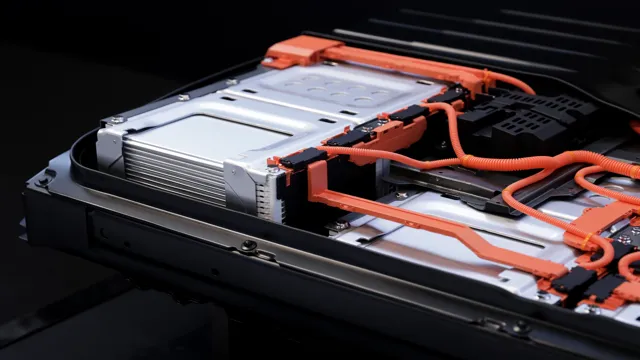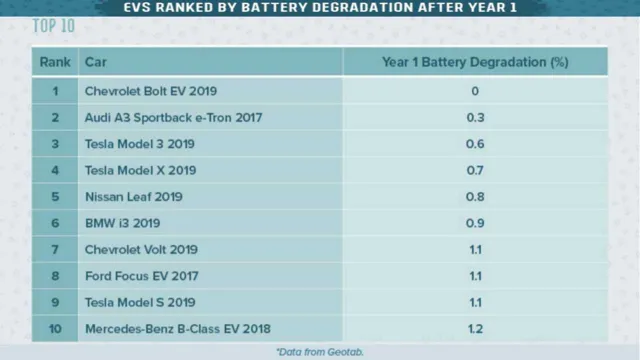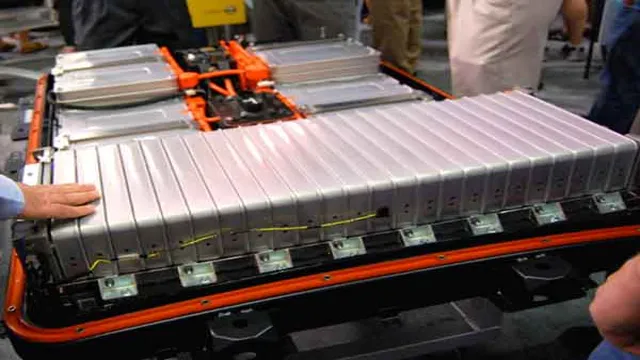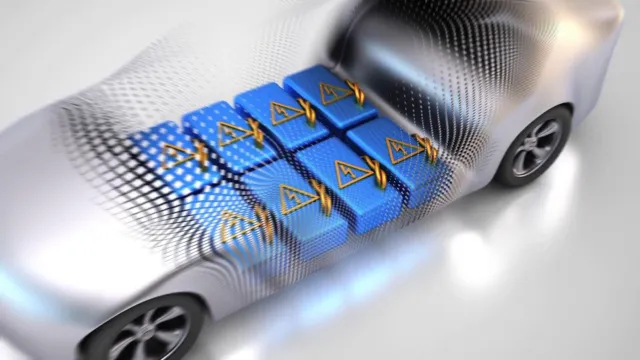Revving Up the Debate: Comparing Car Battery vs Electric Car Battery – Which is Right for You?
When it comes to power supplies for our cars, we often think of the traditional car battery. However, as electric cars are becoming more and more popular, the electric car battery has also entered the conversation. While both types of batteries serve the same basic function, they have some significant differences that are worth exploring.
In this blog post, we will dive into the similarities and differences between car batteries and electric car batteries, in order to better understand which might be the best fit for your vehicle. So, let’s get charged up and start exploring!
Introduction: Understanding the Differences
Car battery and electric car battery are two different types of batteries with distinct differences. The first obvious difference is that car batteries are generally used to start a gasoline-powered vehicle, while electric car batteries are responsible for powering the entire vehicle. Car batteries use lead-acid chemistry, which involves a chemical reaction between lead and sulfuric acid to produce electricity.
On the other hand, electric car batteries use lithium-ion chemistry, which yields a high energy density as compared to lead-acid batteries. Electric car batteries also require a significantly larger storage capacity to power an electric car. Finally, electric car batteries require a different charging infrastructure as compared to traditional car batteries.
In conclusion, while on the surface, car batteries and electric car batteries may appear similar, they differ in size, chemistry, and charging infrastructure.
Car Battery Basics
Car battery basics are essential knowledge for any driver, especially when considering the differences between various battery types. There are three primary types of car batteries: lead-acid, absorbed glass mat (AGM), and Lithium-ion. Lead-acid batteries are the most common and affordable, but they may require more maintenance and have a shorter lifespan.
AGM batteries are more durable and don’t require as much maintenance, but they can be pricier upfront. Lithium-ion batteries are newer to the market and offer longer lifespans and quicker charging times, but they are currently the most expensive option. Understanding the differences between these types of batteries can help you make an informed decision when it’s time to replace your car’s battery.

Electric Car Battery Basics
Electric car batteries are becoming more commonplace as consumers seek out eco-friendly options for transportation. However, understanding the differences between the types of electric car batteries can be confusing. The two main types of electric car batteries are lithium-ion and nickel-metal hydride.
Lithium-ion batteries have higher energy densities, which means they can hold more charge and provide longer driving ranges. Nickel-metal hydride batteries, on the other hand, are more affordable and reliable, but have a lower energy density. Additionally, each manufacturer may have their own specifications for their batteries, such as voltage and capacity.
It’s important to research and compare different electric car models to determine which battery type will be the best fit for your transportation needs.
Performance Comparison: Which Lasts Longer?
When it comes to comparing a traditional car battery to an electric car battery, several factors come into play. Firstly, traditional car batteries are designed to last between 3-5 years, depending on the manufacturer’s specifications and operation. On the other hand, electric car batteries are relatively new technology, and their longevity is still being tested.
However, most electric car batteries have a lifespan of around 8-10 years. While electric car batteries may have a longer lifespan, they can be more costly to replace than their traditional counterparts. Additionally, the performance of both batteries also varies.
Traditional car batteries provide a consistent power source, while electric car batteries experience degradation over time, reducing their maximum range. Overall, the type of battery that lasts longer depends on the user’s needs and how they operate their vehicle. However, the trend indicates that electric car batteries have a longer lifespan, making them a more sustainable and cost-effective option in the long run.
Factors That Affect Car Battery Life
Car battery life If you’re wondering how long your car battery will last before it needs to be replaced, there are several factors that will determine the answer. One major factor is the weather. Extreme temperatures can cause battery fluid to evaporate, leading to corrosion and a shorter lifespan.
The type of vehicle you drive and how frequently you use it also play a role. If you frequently take short trips or leave your car sitting unused for long periods, your battery is more likely to wear out quickly. Additionally, the quality of the battery itself can make a big difference, with higher quality batteries lasting longer than cheaper options.
Overall, it’s difficult to say exactly how long a battery will last, but by taking care of your vehicle and investing in a quality battery, you can help ensure a longer lifespan for your car battery.
Factors That Affect Electric Car Battery Life
When considering the factors that can affect electric car battery life, it’s important to note that performance can vary depending on a few key factors. One of the major considerations is the type of battery technology used, with some varieties being more durable and longer-lasting than others. Additionally, driving habits such as regular charging and steady acceleration can also have an impact on battery longevity.
It’s important to note that regular maintenance and careful use of the vehicle can help ensure that the battery lasts as long as possible. When comparing various electric car options, it’s important to examine the specific battery technology and performance data in order to determine which models are likely to offer the longest-lasting and most reliable battery performance. By doing so, drivers can invest in an electric car that meets their needs for eco-friendliness and long-term efficiency.
Comparing the Lifespans of Car and Electric Car Batteries
When it comes to comparing the lifespans of car and electric car batteries, it’s not as simple as declaring one to be the clear winner over the other. It’s true that electric car batteries can last for hundreds of thousands of miles, while the lifespan of a traditional car battery typically ranges between three to five years. However, electric car batteries are much more expensive to replace, and the technology surrounding them is still evolving.
On the other hand, traditional car batteries are cheaper and have been tried-and-tested over decades. It ultimately comes down to individual preferences and priorities – if you prioritize long-term cost savings and eco-friendliness, an electric car battery may be the way to go. But if you prioritize affordability and reliability, a traditional car battery is likely the better option.
Cost Comparison: Which is More Expensive?
When it comes to car batteries, it’s easy to assume that electric car batteries are significantly more expensive than traditional car batteries. However, the truth is a bit more complex. While electric car batteries have a larger upfront cost, they generally last much longer than traditional car batteries.
The average lifespan of a traditional car battery is around 3-5 years, while an electric car battery can last anywhere from 8-15 years. Additionally, electric cars are often more energy-efficient, meaning you’ll save money on fuel costs over time. Ultimately, it’s difficult to make a direct cost comparison between car batteries and electric car batteries, as the two operate in very different ways.
However, if you’re concerned about the cost of ownership over the long term, it’s worth considering the benefits of an electric car battery.
Upfront Costs of Car Batteries
Car batteries can be expensive upfront, but it ultimately depends on the type of battery you choose. For example, traditional lead-acid batteries tend to cost less, with an average price range of $50-$150. However, these batteries have a shorter lifespan and may require more maintenance over time.
On the other hand, newer technology like lithium-ion batteries may cost more upfront, with an average price range of $100-$300. However, they have a longer lifespan and may require less maintenance, which could save you money in the long run. It’s important to consider both the upfront cost and the long-term savings when choosing a car battery that fits your budget and needs.
Upfront Costs of Electric Car Batteries
When considering a switch to an electric car, one of the big concerns is the cost of the battery. Compared to traditional gas-powered vehicles, the upfront costs of electric car batteries are higher. However, it is important to consider the long-term savings that come with owning an electric car.
While gas prices can fluctuate, electricity rates tend to remain stable. Additionally, electric cars require less maintenance and have a longer lifespan. So, while you may pay more upfront for the battery, you will save money in the long run.
It’s important to do your research and compare prices, as different models and brands may have different costs for their batteries. Overall, it’s clear that the upfront costs of electric car batteries can be a deterrent for some buyers, but considering the long-term savings and benefits, it’s worth considering.
Long-Term Cost Analysis of Car and Electric Car Batteries
When it comes to comparing the long-term costs of owning a traditional car versus an electric car, there are a few key factors to consider. While electric cars may have a higher upfront cost, they typically have lower maintenance and fuel costs over time. On the other hand, traditional cars may be cheaper upfront, but require more frequent maintenance and have higher fuel costs.
Additionally, the cost of replacing an electric car battery can be expensive, but the prices of batteries are constantly decreasing as technology advances. All of these factors should be taken into consideration when deciding which type of car is more expensive in the long run. Ultimately, it depends on individual circumstances and driving habits.
Environmental Impact: How Do They Affect the Planet?
When comparing car batteries and electric car batteries, one important factor to consider is the environmental impact. Traditional car batteries contribute to pollution since they are made with lead-acid and require regular replacements. On the other hand, electric car batteries have a much lower environmental impact as they are rechargeable and typically last much longer than traditional car batteries.
Additionally, electric cars can be charged using renewable energy sources, such as solar panels, which further reduces their environmental impact. So when deciding between a traditional car and an electric car, it’s important to consider not just the upfront costs but also the long-term environmental impact of your choice. By choosing an electric car with a rechargeable battery, you’re not only helping to reduce pollution but also contributing to a more sustainable future.
Carbon Emissions from Regular Car Batteries
Carbon emissions from regular car batteries can have a significant impact on the environment. When a car battery is charged, it emits carbon dioxide into the air. This may not seem like a big deal at first, but when you consider the number of cars on the road and the regular use of vehicles, the amount of carbon dioxide being released into the atmosphere adds up quickly.
Over time, this can contribute to climate change and other environmental problems. Additionally, the production of car batteries also has an environmental impact. The materials used to make the batteries, such as lithium or cobalt, are often extracted through mining, which can be damaging to ecosystems.
In short, the use and production of regular car batteries can have a significant impact on the planet. It’s important to consider alternative forms of transportation and energy production to help reduce these negative effects.
Carbon Emissions from Electric Car Batteries
Electric car batteries are often touted as an eco-friendly alternative to their gasoline-powered counterparts, but the manufacturing process can have a hefty environmental impact. The production of electric car batteries involves mining and refining raw materials such as lithium, copper, and cobalt, which can generate large amounts of greenhouse gas emissions and other pollutants. In addition, the electricity used to power the manufacturing process may come from sources such as coal-fired power plants, which are significant contributors to carbon emissions.
However, it’s important to note that these emissions are a one-time cost, as electric vehicles produce significantly less greenhouse gas emissions during their lifetime compared to traditional gasoline vehicles. In fact, studies have shown that over the lifetime of an electric vehicle, the savings in emissions compared to a gasoline-powered car can be significant, even when accounting for the emissions generated during battery production. So while the environmental impact of electric car batteries may be a concern, the overall benefits of electric vehicles in reducing emissions make them a worthwhile alternative.
Impact of Recycling Car and Electric Car Batteries
Recycling car and electric car batteries is crucial in reducing environmental damage caused by their improper disposal. These batteries contain hazardous materials that can harm the environment and human health if not handled properly. However, recycling them can also have significant benefits.
For instance, it reduces the need for mining new materials, conserves resources, and reduces greenhouse gas emissions. Recycling also reduces the risk of toxic materials leaking into the soil and waterways and minimizes the need for landfills. The recycling process involves melting the metals and plastics, which are then reused for various purposes.
As a result, recycling car and electric car batteries is a sustainable way of managing their waste and provides economic benefits, including job creation. Ultimately, it is our responsibility to protect the planet by adopting sustainable practices such as recycling, and recycling car and electric car batteries is one step in the right direction.
Conclusion: Which is the Better Option?
When it comes to car battery vs electric car battery, the verdict is clear: electric car batteries are the way of the future. Not only are they more efficient and environmentally friendly, but they also have the potential to completely revolutionize the automotive industry as a whole. So while traditional car batteries may have once been the backbone of our transportation system, it’s time to plug in and embrace the power of electric.
“
FAQs
What is the difference between a car battery and an electric car battery?
A car battery is designed to provide the necessary power to start a gasoline engine, while an electric car battery is designed to power an electric motor.
How long does a car battery last compared to an electric car battery?
The lifespan of a car battery can vary greatly depending on usage and conditions, but typically lasts 3 to 5 years. An electric car battery typically lasts 8 to 10 years or longer.
What are the environmental impacts of car batteries and electric car batteries?
Car batteries can contain lead and other toxic chemicals, which can harm the environment if not disposed of properly. Electric car batteries contain lithium and other metals, which can also pose environmental challenges, but are often recycled at the end of their useful life.
How do the costs of car batteries and electric car batteries compare?
The cost of a car battery can range from $50 to $200, while the cost of an electric car battery can range from $5,000 to $20,000 or more, depending on the size and capacity of the battery. However, the fuel savings and other benefits of electric cars can offset the higher upfront cost over time.




